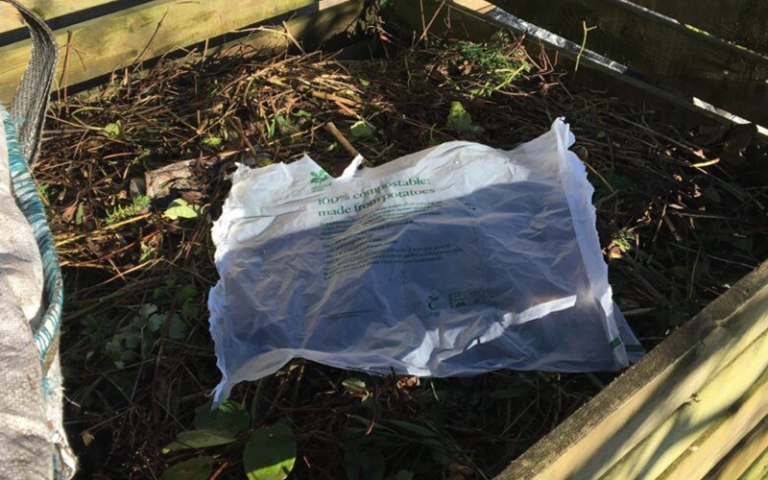A design-led approach to tackling plastic waste
To help reduce waste, the Big Compost Experiment – led by UCL’s Plastic Waste Innovation Hub – is using ‘citizen scientists’ to gauge the public's appetite for composting biodegradable plastics.

4 February 2021
Plastic waste is a global problem that is harming marine and aquatic species, disrupting soil ecosystems and polluting groundwater reserves. But single-use plastics have been integral to many advances in healthcare and within global supply chains such as the provision of clean drinking water and in food hygiene and transportation.
“Forty per cent of the world’s plastic is used in packaging in one form or another,” explains Ayşe Allison (PhD Psychology & Language Sciences), who is working on the project as part of the UCL Plastic Waste Innovation Hub and UCL Centre for Behaviour Change.
“Compostable plastics might allow us to exploit the benefits of plastic without creating waste, but only if they are managed appropriately after they’ve been used – for instance, whether they have been correctly disposed of in the right bin by the end user. They then need to be correctly managed post-consumer, for example, collected into the appropriate waste stream and processed in the right conditions for biodegradation.”
The hub is a multidisciplinary team of scientists, engineers, designers and social scientists at UCL, who are taking a design-led approach to creating and testing new interventions to eliminate plastic waste. Specifically, Ayşe’s research focuses on understanding and changing people’s behaviours with respect to compostable plastic and food waste.
Our work is helping us understand consumer behaviours that contribute to plastic and food waste.
The Big Compost Experiment, devised by hub members Danielle Purkiss (Civil, Environmental & Geomatic Engineering) and Professor Mark Miodownik (UCL Mechanical Engineering), is providing some of the answers. By working with hundreds of ‘citizen scientists’, the project is seeking to find out what the UK public think of biodegradable and compostable plastics and whether the products live up to their name.
The team designed an online survey and a simple home-based experiment to see how long packaging labelled as ‘biodegradable’ and ‘compostable’ take to degrade in a household composter. The survey has elicited over 10,000 responses to date and 2,700 people have set up their own composting experiment, with data feeding into a live map of home composting activities across the UK.
The survey explores what motivates people to buy or avoid biodegradable plastic packaging. Four out of five respondents said they would buy products with packaging marked ‘compostable’ or ‘biodegradable’, but some were put off by confusing terminology and lack of detail on how to dispose of packaging.
Initial analysis of the composting experiment shows that after nine months, biodegradable packaging was still visible in two out of three compost bins.
“Our work is helping us understand the public’s behaviours that contribute to plastic and food waste. The knowledge we gain will help us design interventions that will encourage people to change their behaviour,” explains Ayşe.
 Close
Close


